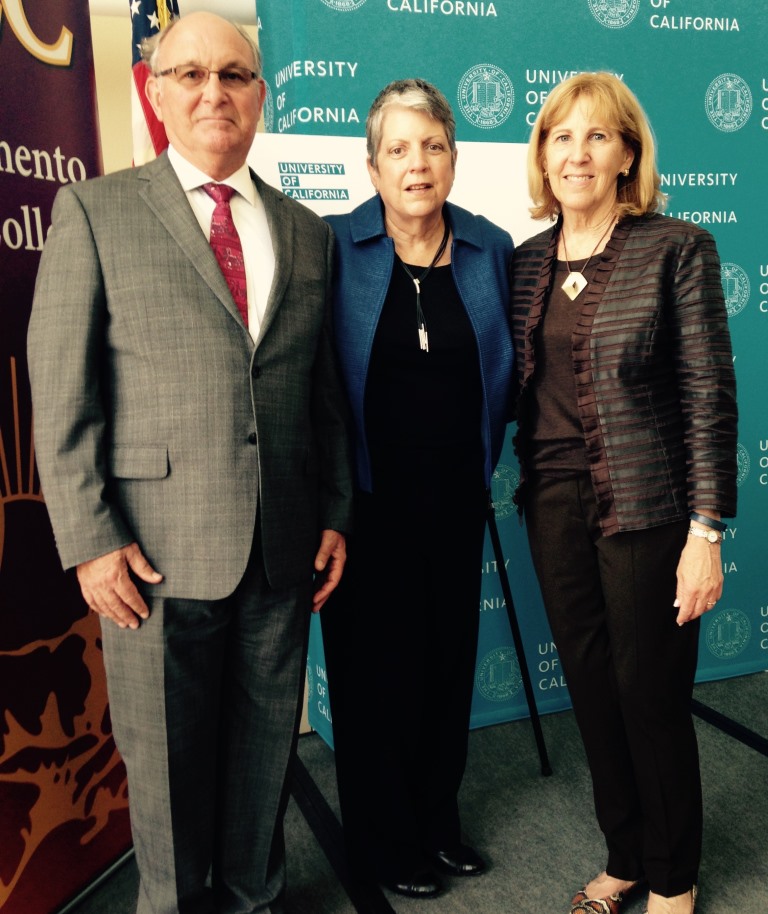August 2015
Ten UC Transfer Pathways Take Effect
 |
Senate Vice Chair Dan Hare & Chair Mary Gilly with President Napolitano at a July 7 press event announcing the UC transfer pathways |
Thanks to the efforts of the faculty and staff, the first phase of a project to adopt common systemwide transfer pathways for 21 majors is complete.
On July 1, following campus-based reviews of agreements reached by faculty at three April workshops, UCOP unveiled a website detailing systemwide transfer preparation pathways for Anthropology, Biochemistry, Biology, Cell Biology, Chemistry, Economics, Mathematics, Molecular Biology, Physics, and Sociology. President Napolitano introduced the pathways at a joint press conference with UC Academic Senate and intersegmental higher education leaders on July 7.
The effort follows a recommendation in the 2014 Transfer Action Team report to streamline the transfer admission pathways from the California Community Colleges (CCC) to UC by aligning the preparation requirements for specific majors across UC campuses. That report revealed that CCC students often have difficulty preparing simultaneously for transfer into a similar major at multiple UC campuses.
President Napolitano asked the Senate to facilitate the completion of agreements for 10 majors by the end of the 2014-2015 academic year, and 11 more the following year. In April 2015, Senate Chair Gilly and Vice Chair Hare led three workshops for faculty from ten popular majors to identify a single set of major-specific lower division coursework for CCC students to follow as preparation for transfer admission in each major at all campuses.
Senate leaders say the pathways will make it possible for transfers to prepare simultaneously for the same major at multiple UC campuses, and will help ensure that transfers arrive prepared to compete with native juniors and graduate in two years. The pathways also will help UC meet its agreement with the Governor to improve the transfer path and increase the number of transfer students.
“When faculty understood the challenges transfer students face in preparing for multiple campuses, they were very supportive of this effort,” said Senate Chair Gilly. “They saw it as an opportunity to communicate to transfer students what courses to take if they want to apply to multiple UC campuses (on average, transfers apply to four), and have them arrive better prepared to graduate in two years.”
The Senate office has scheduled three October meetings for campus faculty and academic administrators who are responsible for evaluating and/or deciding transfer preparation requirements from 11 additional majors: English Literature, Film Studies, History, Philosophy, Business Administration, Communications, Political Science, Psychology, Computer Sciences, Electrical Engineering, and Mechanical Engineering.
Chair Gilly says the pathways are not intended to be a set of requirements, but rather UC’s best collective advice to transfers about the preparation that will ensure they are competitive for admission to a major at all nine UC undergraduate campuses and prepared to graduate two years after matriculation.
“Campuses should not expect students to take more than the pathway to be competitive,” she said.
The systemwide website refers students to individual campus websites for a complete list of expected major preparation coursework and information about minimum GPA requirements for the campus and specific courses.
UC Senate and administrative leaders also met with CSU and CCC colleagues at a June meeting in Oakland to introduce the UC pathways and discuss their relationship to the Associate Degrees for Transfer and Transfer Model Curricula (TMC) used by CSU and the CCCs. Senate Bill 1440 requires the CCC to develop 60-unit Associate Degrees for Transfer (AD-T) that guarantee admission into a CSU bachelor’s degree program and a degree following an additional 60 units of CSU coursework. CSU and CCC have developed TMCs identifying the coursework needed for an AD-T, for 33 majors. As UC develops its pathways, it is also noting the differences and similarities with the CSU TMC for a given major.
Over the coming months, BOARS and campus admissions directors will be considering next steps for implementing the UC pathways, which include improving the articulation of individual CCC courses across UC campuses, communicating information to CCC students about courses available at their local college that will satisfy a pathway, and establishing a process for vetting a campus’s proposed change to major preparation that affects a systemwide pathway.
